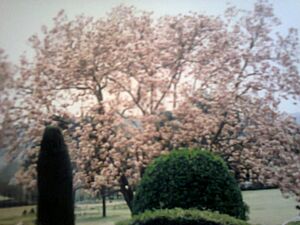Lady Garden Park facts for kids
The Lady Garden Park is a well-known public park located in Abbottabad, a town in Pakistan. It was originally called the Ladies' Garden. Today, it is a popular spot for families and friends to relax and enjoy nature.
Contents
History of Lady Garden Park
How the Park Started
The Lady Garden Park was created shortly after the town of Abbottabad was founded. This happened in January 1853. Major James Abbott, who founded the town, also started this park.
A Park for Everyone
When it was first built, the park was mainly for European families living in the area. It was different from other parks that were open to everyone. The park was set up in a large military area, right across from St. Luke's Church, Abbottabad. Many beautiful trees and flowers were brought from England and other places to be planted here.
Opening to the Public
For many years, the park remained exclusive. But after Pakistan became an independent country in 1947, the park was opened for all people to enjoy.
What You Can Find at Lady Garden Park Today
Fun for Families
Today, Lady Garden Park is a favorite place for people in Abbottabad. It has large open green areas with lawns and walking paths. There is also a special section just for women and children. This area has fun playground equipment like swings, slides, and see-saws.
Relaxing Spots
You can find a small snack bar in the park, perfect for a quick bite. There are also benches placed in nice spots under old, shady trees. These are great places to sit and relax.
Major Abbott's Poem
A special feature of the park is a large stone slab. On this stone, you can read a copy of a farewell poem. This poem was written by Major Abbott, the founder of Abbottabad. It is carved beneath a grand cedar tree. Many visitors come to read the poem and take photos here.
Lady Garden Park in Books
Poetry Connections
The Lady Garden Park has been mentioned in some famous literary works.
- The well-known Urdu poem "Abar" (meaning "Rain-cloud") was written here. Pakistan's national poet, Allama Muhammad Iqbal, wrote it during a visit to the park. This happened in the early 1900s, probably around 1904.
- The park's beautiful old trees are also mentioned in a poem by Pakistani writer Omer Tarin. You can find this poem in his book A Sad Piper, first published in 1994.
- You can read the full text of Major James Abbott's poem about Abbottabad here (on English Wikipedia).
 | William M. Jackson |
 | Juan E. Gilbert |
 | Neil deGrasse Tyson |


